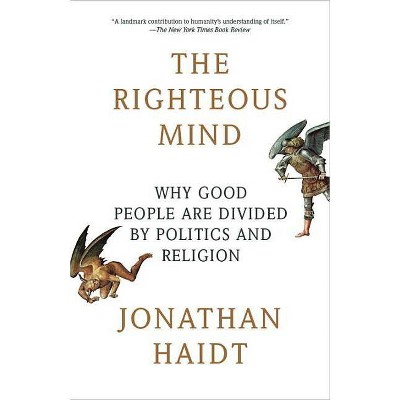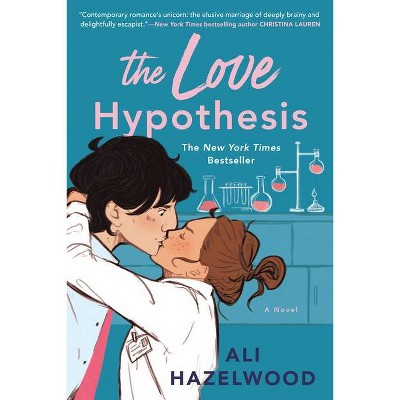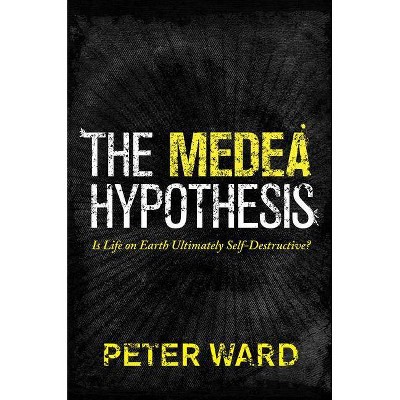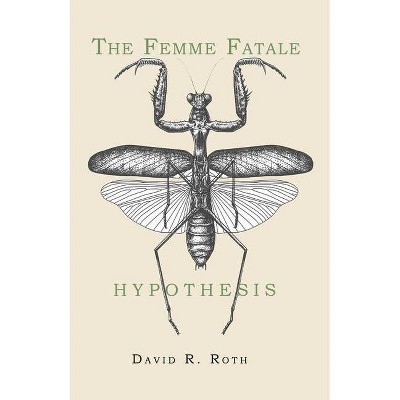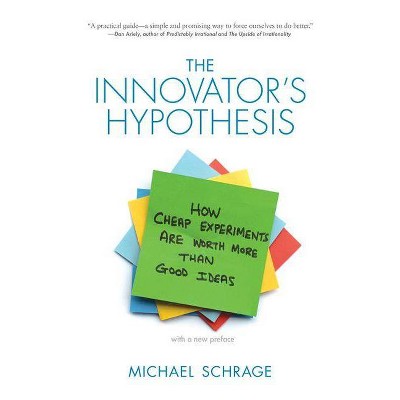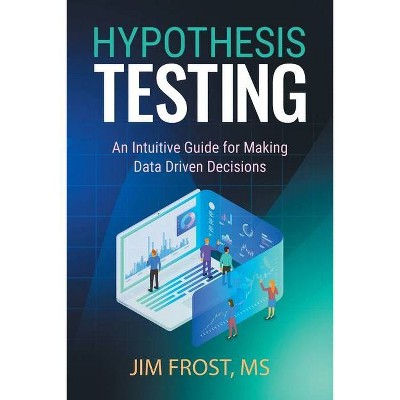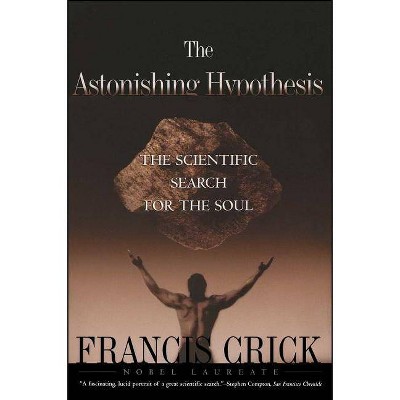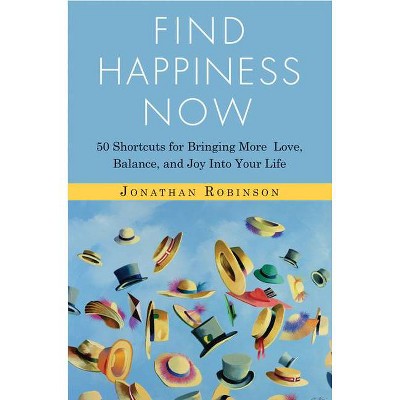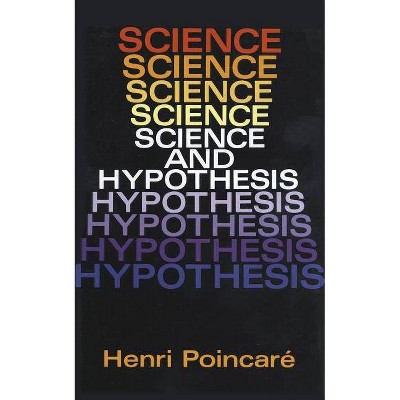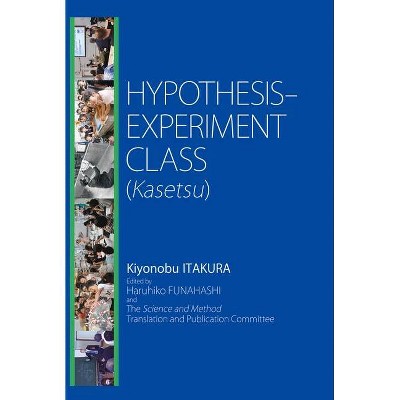The Happiness Hypothesis - by Jonathan Haidt (Paperback)
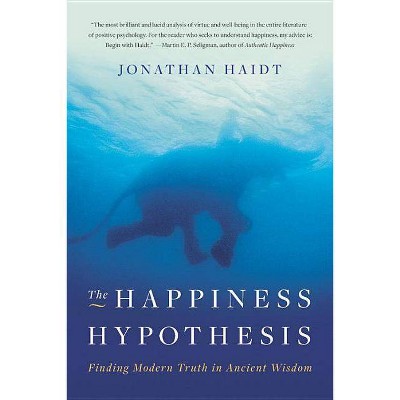
Similar Products
Products of same category from the store
AllProduct info
<p/><br></br><p><b> About the Book </b></p></br></br>An award-winning psychologist examines the world s philosophical wisdom through the lens of psychological science"<p/><br></br><p><b> Book Synopsis </b></p></br></br><b>"The most brilliant and lucid analysis of virtue and well-being in the entire literature of positive psychology. For the reader who seeks to understand happiness, my advice is: Begin with Haidt." --Martin E.P. Seligman, University of Pennsylvania and author of <i>Authentic Happiness</i></b> <p/><i>The Happiness Hypothesis </i>is a book about ten Great Ideas. Each chapter is an attempt to savor one idea that has been discovered by several of the world's civilizations<b>--</b>to question it in light of what we now know from scientific research, and to extract from it the lessons that still apply to our modern lives and illuminate the causes of human flourishing. Award-winning psychologist Jonathan Haidt shows how a deeper understanding of the world's philosophical wisdom and its enduring maxims<b>--</b>like "do unto others as you would have others do unto you," or "what doesn't kill you makes you stronger"<b>--</b>can enrich and transform our lives.<p/><br></br><p><b> Review Quotes </b></p></br></br><br><i>The Happiness Hypothesis </i>is a wonderful and nuanced book that provides deep insight into the some of the most important questions in life--Why are we here? What kind of life should we lead? What paths lead to happiness? From the ancient philosophers to cutting edge scientists, Haidt weaves a tapestry of the best and the brightest. His highly original work on elevation and awe--two long-neglected emotions--adds a new weave to that tapestry. A truly inspiring book. --<b>David M. Buss</b>, <i><b>author of The Evolution of Desire: Strategies of Human Mating</b></i><br><br><i>The Happiness Hypothesis</i>... has more to say about the pleasures and perils, the <i>truths, </i> of being alive than any book I've read in a long time. --<i><b>San Francisco Bay Guardian</b></i><br><br>[An] inspiring nuanced study.--<i><b>People</b></i><br><br>[A] marvelous book.... I don't think I've ever read a book that laid out the contemporary understanding of the human condition with such simple clarity and sense. --<i><b>Guardian, (UK)</b></i><br><br>[T]he psychologist Jonathan Haidt shows in his wonderfully smart and readable <i>The Happiness Hypothesis: Finding Modern Truth in Ancient Wisdom </i>[that] modern science and history have a lot to say to each other. --<b>Darrin McMahon</b>, <i><b>The Washington Post</b></i><br><br>A disarming, original book, reassuring to those more conversant with worriment than merriment.... Smart and serious without pomposity. --<i><b>Seattle Times</b></i><br><br>An erudite, fluently written, stimulating reassessment of age-old issues.--<i><b>Publishers Weekly, starred review</b></i><br><br>An intellectual tour de force that weaves into one fabric wisdom that is ancient and modern, religious and scientific, Eastern and Western, liberal and conservative all with the aim of pointing us to a more meaningful, moral, and satisfying life. --<b>David G. Myers, Professor of Psychology, Hope College</b>, <i><b>author of Intuition: Its Powers and Its Perils</b></i><br><br>Haidt's is an open-minded, robust look at philosophy, psychological fact and spiritual mystery, of scientific rationalism and the unknowable ephemeral--an honest inquiry that concludes that the best life is, perhaps, one lived in the balance of opposites. --<i><b>Bookpage</b></i><br><br>Haidt's remedy for the modern glut of frivolous self-help literature is to review and revise the classics, examining the ideas of thinkers like Plato, Buddha and Jesus in light of modern research into human behavior. Along the way, Haidt, a social psychologist, provides practical advice for parenting, romance, work and coping with the political and cultural divisions currently preoccupying the country. --<i><b>Psychology Today</b></i><br><br>I really can't recommend this book enough. It's one of the best and most insightful books I've ever read.--<b>Joe Rogan</b><br><br>In this beautifully written book, Jonathan Haidt shows us the deep connection that exists between cutting-edge psychological research and the wisdom of the ancients. It is inspiring to see how much modern psychology informs life's most central and persistent questions. --<b>Barry Schwartz</b>, <i><b>author of The Paradox of Choice: Why More Is Less</b></i><br><br>It would be something of an exaggeration to say that Jonathan Haidt has found the final answer to happiness, but he has come as close as any other writer of our times. Every page of his book provides gems of insight about the good life and where to look for it. Anyone who is interested in humannature and its potential must read this book. --<b>William Damon, Director, Stanford Center on Adolescence</b>, <i><b>and author of The Moral Child</b></i><br><br>Jonathan Haidt leaves no doubt about the importance of emotion in the creation of personal meaning. This is a delightful and courageous book. --<b>Antonio Damasio</b>, <i><b>author of Looking for Spinoza</b></i><br><br>Should we live our lives by age-old wisdom or the latest discoveries? Haidt gives us the luxury of not having to choose, bringing together both sources of insight in this sparkling investigation into the psychology of life and happiness. --<b>Daniel Wegner</b>, <i><b>author of The Illusion of Conscious Will</b></i><br><br>This fresh and original book goes to the heart of what people have found out about happiness, across cultures and times. Enjoyable, important, and eminently readable. --<b>Mihaly Csikszentmihalyi</b>, <i><b>author of FLOW</b></i><br><br>This is a delightful book.... Haidt's writing embraces spiritual and mystical viewpoints while retaining scientific and rational coherence. --<i><b>Nature</b></i><br><br>This unusual book sets itself apart from the self-help category with its extensive scientific references, and intelligent, neutral prose, while the author's illuminating illustration of how the human mind works is both educational and refreshing. --<i><b>Sunday Times (London)</b></i><br><br>With singular gusto, Haidt measures ten 'Great Ideas' against past/present research in psychology and science. <i>LJ'</i>s verdict: Dr. Phil et al. don't have diddly on the old-school sages. No man is an island, indeed, and no modern reader should be without this carefully considered demystification of life. --<i><b>Library Journal, Best Books 2006</b></i><br><p/><br></br><p><b> About the Author </b></p></br></br><b>Jonathan Haidt</b> is the Thomas Cooley Professor of Ethical Leadership at New York University's Stern School of Business. He is a social psychologist whose research examines morality and the moral emotions. He is the author of <i>The Righteous Mind: Why Good People are Divided by Politics and Religion</i>, and the coauthor of <i>The Coddling of the American Mind: How Good Intentions and Bad Ideas are Setting Up a Generation for Failure</i>.
Price History
Price Archive shows prices from various stores, lets you see history and find the cheapest. There is no actual sale on the website. For all support, inquiry and suggestion messages communication@pricearchive.us
